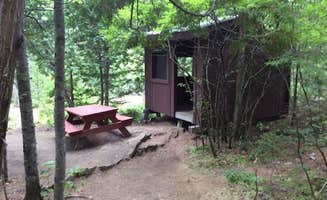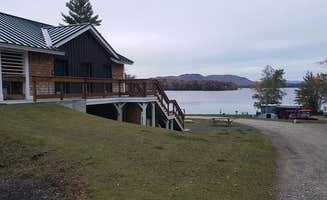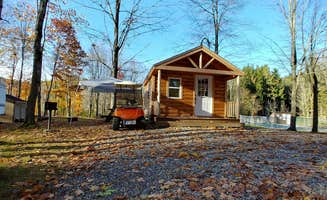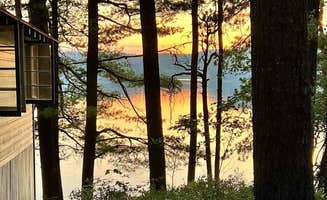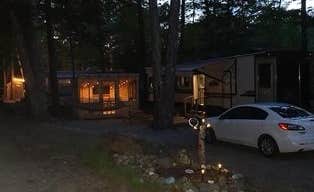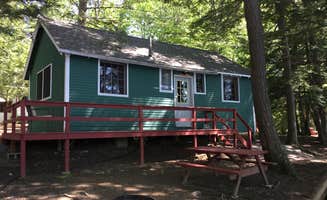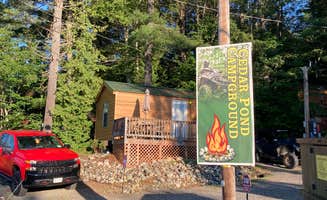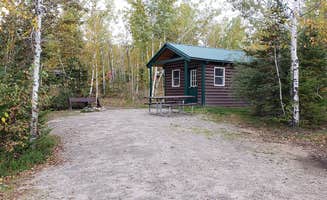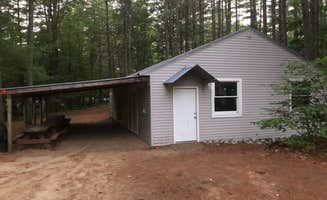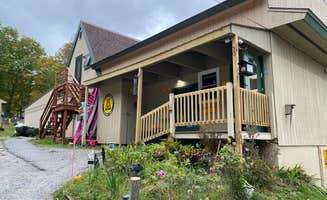Cabins near Weld, Maine provide access to the Swift River region, with elevations ranging from 800-1,500 feet throughout the area. Winter temperatures often drop below freezing from November through March, while summer camping season brings daytime highs in the 70s-80s. Most cabin facilities operate seasonally from May through October, with limited winter availability.
What to do
Gold panning opportunities: Visitors at Coos Canyon Campground and Cabins can rent equipment for gold prospecting directly in the Swift River. "Rent a pan or sluice from the coos canyon rock and gem shop a 3 min walk from the office and pan for gold in the river right from the campground!" notes camper David B.
ATV trail access: Several cabin properties connect directly to regional ATV networks. "Great place to stay with ATV trails access right from your campsite. With the river right close by you can pan for gold," reports Andrew G. about Coos Canyon Campground. Many cabin sites accommodate ATVs with parking spaces.
Hiking nearby mountains: Cabin lodging serves as a convenient base for regional hiking trails. "Close to Tumbledown Mountain hiking, Mt Blue and Webb Lake," writes Camie S. The area offers trails ranging from beginner-friendly paths to more challenging mountain ascents within 30-45 minutes of most cabin sites.
Paddling opportunities: Watercraft rentals are available at several locations. At Papoose Pond Family Campground and Cabins, "Pond with rentals, pool, mini golf, daily activities, crafts... so family friendly," reports Carrie T. Ellis Pond and Webb Lake provide additional paddling options within 15-20 minutes of Weld.
What campers like
Natural swimming areas: Many cabin properties feature swimming beaches or river access. "The canyon itself had tons to explore including rock climbing, cliff jumping, swimming, fishing, a cute little sandy beach for the littles to play on, and so much more," writes Ashley V. about Coos Canyon. Natural swimming holes offer alternatives to chlorinated pools.
Peaceful surroundings: Cabins in less developed areas provide quiet environments. "We had site 7. Sites are good size, and not super close to neighbors," notes David B. at Coos Canyon. Another camper appreciated how "the sites are large, with a choice of wooded, partially wooded, or open."
Wildlife viewing opportunities: Umbagog Lake State Park cabins offer excellent wildlife observation chances just across the New Hampshire border. "We enjoyed early morning and late evening kayak/canoe trips, that were filled with fishing, and wildlife viewing," writes Michelle N. Dawn paddling trips are particularly productive for spotting loons, bald eagles, and occasionally moose.
Trail proximity: Many cabin sites provide direct trail connections. "Short walk over to Coos Canyon rest area with great swim holes," mentions Camie S. Most cabin rentals sit within a 5-minute walk of either water features or trail access points, reducing the need for driving once settled.
What you should know
Reservation timing matters: Most cabin properties fill quickly during peak season. "Umbagog Lake Campground sites fill up on weekends, especially prime lakefront sites," notes one visitor. For weekend dates in July-August, reservations often need to be made 3-6 months in advance.
Limited connectivity: Cell service is spotty throughout the region. "No cell reception and wifi only available at the camp store," reports Camie S. at Coos Canyon. Happy Horseshoe Campground offers slightly better connectivity but still limited coverage.
Varying cabin standards: Accommodations range from basic shelters to fully equipped units. "We rented a one room cabin that was perfect for two who flew in without camping gear. Fridge, coffee pot, microwave and AC," writes Dave M. about Martin Stream Campground. Ask specifically about bedding requirements—many cabins require guests to bring their own linens.
Bathroom facilities: Some cabins have private facilities while others use communal bathhouses. "Our site was close enough to the lake, which made it easy to drop in our kayaks and canoe," notes Michelle N. about lakeside sites. Centralized bathhouses at most properties offer hot showers, though coin operation is common.
Tips for camping with families
Opt for cabins with kitchen facilities: Martin Stream Campground offers cabins with basic cooking amenities. "The sites are large and well kept. The grounds are in great condition," reports Tim M. Kitchen facilities reduce mealtime stress with children.
Consider activity schedules: Some properties offer structured programming. "Tuesday trivia, Wednesday beach party, Thursday dance party, and Friday karaoke—the latter being the most fun!" describes Jessica W. about Papoose Pond. Scheduled activities typically run June-August.
Seek out playgrounds: Properties with play structures help keep younger children entertained. "There is a playground, arcade, and beach. They offer kayak and canoe rentals," notes Drew P. about Honey Run Campground and Beach. Most play areas are designed for children ages 3-10.
Look for shallow swimming areas: Many properties feature beach areas with gradual water entry. "The beach is shallow, and perfect for young children," describes one camper. Water toys and flotation devices are permitted at most swimming areas, though supervision requirements vary by property.
Tips from RVers
Check electrical capacity: Deer Farm Camps & Campground offers water and electric hookups without sewer connections. "Each wooded site is relatively level and offers water and electric hookups, all for a price on par with state parks without utilities," notes Jean C. Verify amperage before booking if running air conditioning units.
Dump station policies: Some properties limit dump station use. "There are no sewer hookups (which is fine) but you are only allowed ONE use at dump station upon leaving the campground," warns Rod L. about one property. Plan accordingly if staying more than a few days.
Site dimensions: Many properties have length restrictions. "Sites are good size, and not super close to neighbors. Wifi only works at the camp store," explains David B. Most cabins with RV parking accommodate units up to 30 feet, with fewer options for larger rigs.
Seasonal considerations: Road access can be challenging during spring thaw. "The campground needs updating for electricity and water. Not enough electricity to run acs last summer," notes one reviewer. May and early June often bring muddy conditions that can complicate RV access to more remote cabin sites.


